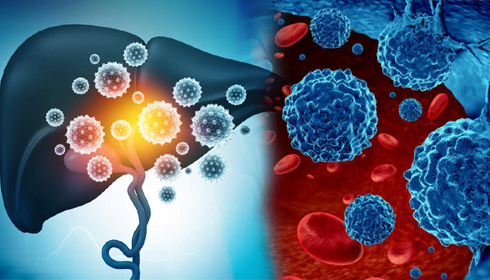
New Vaccine Strategy Offers Hope in Acute Blood Cancer Immunotherapy: Researchers
In a groundbreaking study published in Blood Advances, scientists from the University of Chicago have unveiled a promising approach to enhance immunotherapy for acute myeloid leukaemia (AML) and other blood cancers. Led by Prof. Jeffrey Hubbell and doctoral candidate Anna Slezak, the research introduces a novel method for developing in-situ cancer vaccines, potentially revolutionising the treatment landscape for these challenging diseases.
AML, a type of blood cancer that originates in the bone marrow, poses significant challenges due to its aggressive nature and resistance to conventional therapies. However, the new vaccine strategy holds immense promise by leveraging the body's own immune system to target and eliminate cancer cells.
Unlike traditional vaccines that prevent diseases caused by external pathogens like bacteria and viruses, cancer vaccines are designed to stimulate the immune system to recognise and attack existing cancer cells. This innovative approach aims to overcome a major hurdle in cancer immunotherapy: the ability of cancer cells to evade detection by the immune system.
The research team discovered a unique feature of cancer cells: unpaired cysteine molecules on their surfaces, which can be exploited to specifically target these malignant cells. By attaching an adjuvant to these cysteine molecules, the vaccine material can effectively prime the immune system to recognise and destroy cancer cells.
Anna Slezak explains, "Our material binds specifically to these free thiols and can covalently link our adjuvant to the tumour cell... This is a way to tag cancer cells or debris of dying cancer cells in the circulating blood for immune recognition and trigger immunity to their mutated proteins."
The vaccine construct, enhanced with mannose and a Toll-like receptor-7 agonist, is designed to facilitate the trafficking of cancer cell debris to antigen-presenting cells, thereby activating a potent immune response against the cancer cells.
Remarkably, when combined with low-dose cytarabine chemotherapy, the vaccine demonstrated significantly improved efficacy in preclinical studies, suggesting a promising avenue for combination therapy in AML treatment.
Prof. Hubbell underscores the significance of this approach, stating, "Combination therapies are hard to develop, but they tend to be more effective than monotherapies." By targeting cancer cells directly without the need for specific antibodies, the new vaccine strategy represents a major advancement in cancer immunotherapy.
While further preclinical studies are required before clinical testing, the findings offer a glimpse into a future where personalised immunotherapies could transform the landscape of cancer treatment. With ongoing research focusing on optimising vaccine chemistry and exploring additional therapeutic molecules, the University of Chicago team remains at the forefront of innovation in cancer immunotherapy, offering hope to patients battling acute blood cancers worldwide.